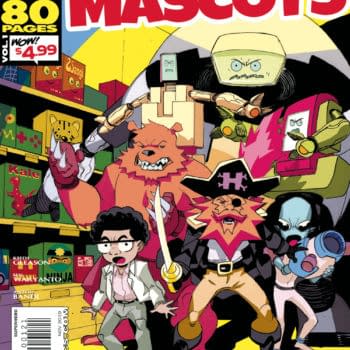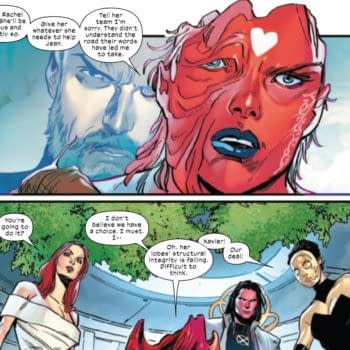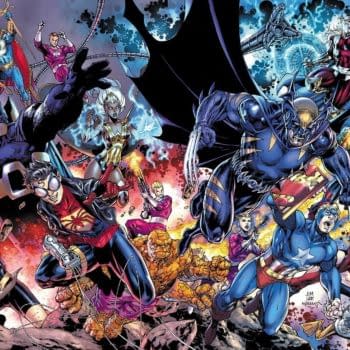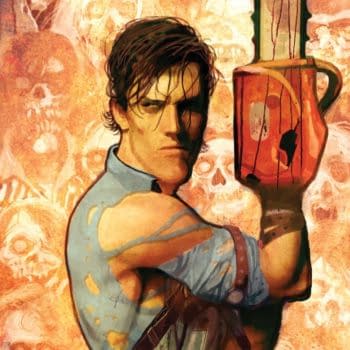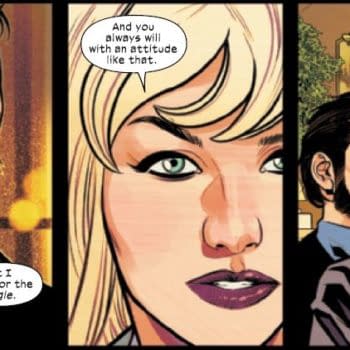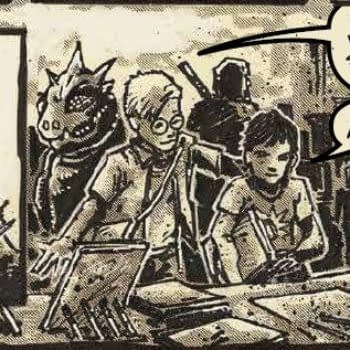Posted in: Comics, Recent Updates | Tagged: crossed, crossedcomic, david lapham, garth ennis, jacen burrows, si spurrier, simon spurrier, wish you were here, wywh, zombie, zombies
Deeply Personal: Si Spurrier Talks about the Weekly Crossed Webcomic
The weekly Crossed: Wish You Were Here ongoing webcomic has been discussed for some time, and it's finally here. Coinciding with the worldwide "C-Day" event for the debut of the bi-weekly Crossed: Badlands comic book series, the March 14th launch date of Wish You Were Here heralds Simon Spurrier's first foray into the Crossed universe. Here, Si provides an in-depth look at the series that will debut at CrossedComic.com in two short weeks.

SPURRIER: It's been a looong time coming. I think we first starting discussing the project in the fall of 2010. I was already balls-deep in a couple of other Avatar projects when William (Christensen) proposed a longform Crossed tale to run on the website.
Frankly, at the start, I was slightly concerned Apocalyptic Survivalist Brutalism™ might make a weird genre-fit for a free webcomic intended to run for at least a couple of years. With something as visceral as horror, familiarity can all too easily breed apathy or desensitization. But I quickly hit on a very particular status quo to underpin the tale – a group of survivors trying (and failing) to maintain a community, just to make their lives worth living – and then a narrative form to tell it – the elegiac journal of one community member – which jointly solve the problem brilliantly. Put simply, it's a story about people – humans like you or I, with real pasts and broken dreams – trying their best to live day-to-day in a hateful, wretched, terrifying, ghastly fucking world. Some days, that means fighting for their lives: all action, madness, adrenaline. Other days, it means squabbling, backstabbing and playing at sleazy politics amongst themselves. Other days still, it means staring at the horizon, bored fucking shitless, secretly wishing for a dose of action, no matter how awful – and remembering the fractured lives and losses which have brought them to where they are.
There are, I've discovered, endless stories to be told… and when you put yourself in the position these guys are in, you realize just how much fiddly and frightful shit you'd have to think about, know about, plan and do and see and experience and endure, just to stay alive.
And of course the question eventually becomes: Why bother?
The publishing model Warren and Paul used for Freakangels was fabulously successful – free weekly episodes online, accessible to all, which are collected, printed, and shilled-like-crazy every half year or so. Given Avatar's astonishing success with other stories set in the Crossed universe, it made sense to bring the plus-faced bastards and their world into the slot vacated by Whitechapel's wonderful weirdists. That said, I've made a few tweaks to the nuts-and-bolts of the Freakangels format to suit the material. For instance, every page in the hard-copy collections will have appeared in their online form as two separate landscape-orientation screens – so no scrolling up and down. That'll mean readers will effectively be getting Twelve! Free! Pages! every week rather than six. I'm using what I call "text blocks" – something I played with very successfully when I wrote Simping Detective for 2000AD – to incorporate chunks of textual narrative without shitting-up the visual flow. If comics are done right, you can "show" and "tell" different things at the same time. Equally, the narrative mechanism of the Diary means that episodes are often self-contained – "a day-in-the-life-of" – which should mitigate the other perennial fear of long-form episodic comics: readers' attention spans are stretched over such long periods it's tough to maintain fiddly plots. This way most weeks is a new story – a new self-contained vignette in the lives of the characters – which build over time into a grander arc.
BC: Now that the launch of Wish You Were Here is finally here, what are you feeling?
SPURRIER: As you'd expect! Delighted, relieved, nervous as hell. I've been thinking about the minutiae of surviving in the Crossed universe for such a long bloody time – cramming my own perspective into the head of this one poor guy, stuck on an island in bumblefuck nowhere, surrounded by weirdoes and irritations and lunatics (not to mention the Crossed themselves, b-dum-*tsh*) – that I simply can't imagine what it's going to be like to share it all with the world.
It sounds a bit ridiculous to say this of a work-for-hire project – especially one which will inevitably be reported and reviewed in terms of bodyshock, gore and dolphinrape rather than the human story at its heart – but Wish You Were Here is one of the most personal things I've ever written. Weird.
BC: What characters should we keep an eye on over the course of the series?
SPURRIER: They've all got stories in them. It's a pretty big cast – there are 24 people on this one little island at the beginning of Episode 1, all conceived and designed with back stories, quirks, and plans – not to mention the recurring faces we're going to meet in flashbacks, the visitors and new arrivals to the island, etc. The biggest key was to introduce these people veeeeery slowly, focusing on one or two at a time, so that readers aren't swamped with a sea of names and faces. For me, the nastiest part of the whole writing progress has been incorporating a sense of randomization and risk into everything. Like I say, every character you meet comes complete with pages of notes… but that doesn't make them safe. They live in an unpredictable world. Sometimes, even while scripting something I thought I'd plotted carefully, I'll realize "he's not getting out of that", or "shit, she's dead…" And then bang: one more empty bed on the island.
Characters to watch…? Hmm. The dynamic between Rab and Don – the island's unofficial chiefs – is always fun to write. One's all about practicality – fishing, surviving, getting-by – and the other's all about community-building, politics, ruthlessly forming hierarchies. Another personal favourite is a guy called Jackson, who shows-up halfway through the first arc. He just walks down out of the hills, wearing a wetsuit and playing the bagpipes, offering to help the Islanders in exchange for one of their sheep. And he ain't planning on eating it.
BC: What's the largest threat facing the survivors?
SPURRIER: Oof. You mean apart from the random and sporadic attacks by roving packs of insane nutbag human predators?
Frankly, when you're past the obvious hack-n-slash-n-rape-n-pillage stuff, a lot of the big dangers are internal. That might mean internal to the group – the schemes, rivalries and romances of this intense, crazy, artificial little community – or more often internal to the hearts and minds of its members. These guys have a lot of time to think, to fret, to freak-out. There's the eternal danger of daydreaming. The danger of losing hope. The danger of getting bored (and the attendant danger of looking for trouble). And there's the abstract danger of asking questions. These guys live surrounded by mysteries, unknowns, weird sights and sounds. There's a constant struggle not to wonder, not to be curious, because there are no satisfying answers. No Google, no Wikipedia, no convenient scientists, no divine inspiration. There's just the horizon, and the terrifying things lurking just beyond it.
Lastly… over the course of the entire story, we're going to discover the most terrible danger of all has been in plain sight the whole time. Dum dum duuum.
BC: With such a large cast, will we be learning more about how the Crossed plague initially spread throughout England? Any origin stories of the survivors that you expect will really get the fans buzzing?
SPURRIER: Lots of origin stories. In the first instance, we're flashing back to the protagonist's experience of the Arrival Of The Crossed – and the journey which brought him to the island will be a continuous parallel thread to the present day events – but we're also going to see how other members of the community survived that initial terror.
There's an episode during the first arc revolving around a woman called Sofia… it's not quite an origin tale – that's sort of the point of it (sorry – I'm being mysterious) – but it's heartbreaking. And very illustrative of how the "rules" of a functioning community have changed.

SPURRIER: Cava's a shithole. Just over a mile long, three-fifths of a mile wide at its widest point. No trees, no features. A barren splat of grass in the heart of the Orkneys, whose only buildings are a crappy old lighthouse and a tumbledown crofter's cottage from the 1920's.
In a way, its sheer mediocrity is what makes it the perfect place to live. All that grass makes perfect grazing for sheep. There are rabbits, plenty of fish, and loads of seals. There are no decent anchorages or coves anywhere near, and the island's surrounded on all sides by incredibly shallow waters — so if you want to land a boat you're going to get beached a loooong way out, then have to wade ashore. Which takes time… during which the Islanders can cheerfully be riddling you with bullets. Further out, the deeper waters are part of the Scapa Flow – which has a famously deadly current. Don't expect to creep up on Cava by swimming.
The islanders have erected a lookout tower at the island's highest point. During the day they have two lookouts: one up the tower, one on the roof of the lighthouse. They've got an uninterrupted view of the waters, the nearby islands, the hills of the mainland, etc. They've got a bell-system so islanders can be warned of an attack and its direction, and have plenty of time to break-out the defences. That said, not being attacked is obviously preferable to successfully repelling attackers, so camouflage and discretion are the orders of the day. No fire-smoke except on overcast nights, all buildings covered in camo and grass, all sheep dyed green, etc. Even if any Crossed are wandering around on nearby islands, they'd have to get lucky to spot Cava's inhabitants.
Luckily for our guys, the Crossed are creatures of instinct first and strategy second: they have a vicious sort of cunning, but not much by the way of coordination. At least, that's the way it seems…
At night all the islanders withdraw to the very tip of the island, near the lighthouse. A series of defences and noise-traps are erected, so that if any Crossed successfully lands on the main part of the island, they won't get close without tripping an alarm. Two lookouts are placed in the lighthouse – one with a listening-trumpet, the other with a night-vision camera – to watch the seas and listen-out for the laughter of lunatics and the screams of their victims. It's a nerve-wracking, lonely job.
And it's a nerve-wracking, lonely island. No wonder its inhabitants are eternally confused about whether they want to stay, or take a chance back on the mainland.
BC: You based the main character and narrator Shaky largely on yourself. How closely do you match up? When Shaky tries to identify his place in a society that's crumbling and has no place for him, are you affected on a personal level?
SPURRIER: So… I don't want to create the impression I'm performing some sort of metafictional WORDMAJIK bollocks here, but… yeah. The main character, Shaky, is a sort of Elsewords version of me. The rationale's pretty obvious: if you want to write this sort of speculative fiction in a way which resonates with readers and has emotional integrity, you have to be prepared to imagine yourself experiencing all that your characters experience. In my case, that meant wondering how I'd cope in a world where all the things I've ever considered myself vaguely good at – writing things down, making shit up, arguing about religion in pubs, etc., etc. – mean precisely Dick. I can't fish, I can't hunt, I'm probably a bit of a coward, my hands shake from too many years of boozing and I'm incapable of taking a shit if I even suspect anyone is listening. These are not useful attributes in a post-apocalyptic world.
So. Shaky is a guy who once wrote novels and comics. He's spent his life defining his self-worth according to the responses of the people around him to his "art". And now: kaboom. He lives in a world where art, creativity, and culture are unaffordable luxuries. What the fuck does he do? There's this whole little sub-plot rumbling away about the way Shaky relates to another character called Tabitha, who's a painter. For her, art is all about expression: it's irrelevant whether there's an audience or not. Shaky doesn't feel like that, and it's killing him. He's keeping a diary specifically so he's got someone – abstractly – to write for.
Aaaand that's just one little element of the whole thing. The other characters' stories and voices are just as carefully-considered and personal – it's just that I can approach them from an honest perspective which, broadly, matches my own. No matter how bad a light it casts me in!
BC: Wish You Were Here is the first long-form Crossed storyline, following a set cast for a long, long time. With a world as inherently deadly as the Crossed world is, how do you hope maintain the cast and drama for the "long form"?
SPURRIER: A strange combination of very detailed planning and willful randomization. That sounds contradictory, but it's not. I know how the story's going to end, I know a couple of the major beats on the way, I know how certain of the plots will resolve… But in order to be honest to the "anything can happen" terror of these characters' situation, I'll often sit down to write an episode with no idea how it'll end — and who'll survive it. Part of the fun – and the challenge – is to occupy the brainspace of this poor fucker trying to write a diary about this chaotic, abhorrent world. His instinct is always to look for patterns, to create narratives, to disseminate some sort of learned-lesson or message. Sometimes, he manages it. Often, it's not possible: just a cavalcade of senseless horror, with no "moral of the story". I tend to think those are the most affecting stories of all.
If nothing else, it keeps things constantly fresh and dangerous. New characters appear, old characters disappear – or reveal themselves in a new light you never suspected. Big dramatic climaxes occur, stuff changes. Only the themes remain constant.
BC: The launch of WYWH coincides with the larger Crossed event, "C-Day" (a worldwide promotion and in-store celebration of the ongoing Crossed: Badlands series). What are your thoughts on the reach of the franchise and Wish You Were Here's place in the overall universe?
SPURRIER: The beauty of the Crossed world is that it hinges on a concept – a worldwide outbreak of… well… of something – rather than on a particular character or place or time. Garth Ennis's initial run focused on a specific group of survivors, but subsequent stories by other writers and artists have taken the same starting point and run off in gloriously different directions with very different characters. It's so easy – and lazy – to mistake this stuff for just another crappy zombie-esque "outbreak" story… to focus on the gore and the violence and the revolting human acts… but it's so much more than that. The shorthand for explaining the outbreak to people is that it's like a "Contagious Form of Psychopathy", but that doesn't really do it justice either. At its true base, the Crossed condition is simply the removal of all learned cultural and societal behaviors. It's about people being restored to a state of pure primal instinct, whose only pleasure lies in destruction, violence and sexual deviancy. It's raw humanity: everything we "civilized" people think of as being "evil"… but which we all secretly know lurks inside every one of us, beyond morality or judgement.
Wish You Were Here is simply another take on the same formula. Where other stories have tended to revolve around groups of survivors endlessly trying to stay one step ahead of the marauding gribblies, I've taken a slightly different approach. The guys on Cava all have one thing in common: they're all either too broken, too exhausted, too angry, or just too bloody useless to Keep Running. They've chosen to stop. To make a go of building a functioning community. To live.
…They're all doomed, of course, and mostly they know it. But – as they see it – what's the alternative? One of the big story threads we'll be exploring revolves around precisely that notion. Now that you've found sanctuary… now that you're settled and there's nowhere left to run… what the fuck do you do with your life?
I don't think it's giving too much away to say that, in later arcs, a significant amount of what goes on doesn't occur on Cava at all.
BC: What's your sales pitch for Wish You Were Here? What will make readers keep coming back week after week?
SPURRIER: The official blurb says it all:
"Wish You Were Here is a story about a fixed community on one of the bleak little rocks off the coast of Scotland. It's about monsters who look like people, and people who act like monsters. It's about how a changed world changes its inhabitants. It's about class and violence and dignity and love. It's about twenty-four doomed souls, each with their own story, trying to find a reason to Stay Alive. It's about resources and strategy and survival. It's about faith and art and misery. Oh, and in Episode #3 a cow shits out a grenade and explodes."


